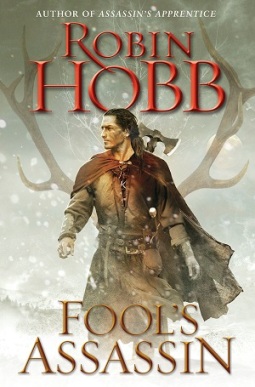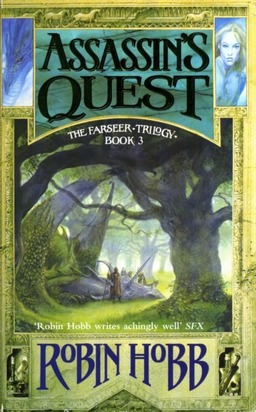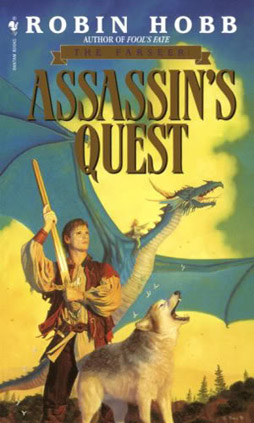Fool’s Assassin: How Robin Hobb Writes Lyrical Fantasy Without Being Boring

If you’re looking for a review of Robin Hobb’s Fool’s Assassin, please go away. This is a dissection, not a review, and it’s full of (slightly obfuscated) spoilers.
If you are wondering how Hobb works her magic, but haven’t read this book, then your probably want to do that first. However, if that means starting from the beginning of the Assassin series, then you can safely read on because by the time you reach Fool’s Assassin you’ll have forgotten.
It is a good book. It’s as if Mary Renault or Rosemary Sutcliff wrote Fantasy, or if Tolkien channeled Thomas Hardy with more magic ninjas. It’s also a very rare bird; a country house Gothic from the point of view of the moody denizens.
From a writerly point of view, it’s interesting because she makes two things work that are often the comeuppance of lesser writers: a first person narrative in a slow burn thriller, and rich description.
Here’s how I think she does it.

First Person Slow Burn Thriller
Fool’s Assassin is a slow burn thriller in that the protagonists, the hero and his daughter, spend a good proportion of the book thinking they’re in a Period Drama (an inside out Gothic mostly): can they cope with class, middle age, old age, bereavement, coming of age (of a sort), and the intrusion of strangers to their world?
However, the Thriller plot keeps dropping ninjas and princesses on them. The snag is that this is all narrated in first person. Remember Orson Wells said he could make a screen kiss last indefinitely as long as he first showed a time bomb being planted under the table? That’s a typical Thriller technique:
Scene 1: Hitman gets into position. Scene 2: Protagonist worries about making her husband’s birthday party the best ever. Scene 3: A drone hovers outside the bathroom window.
You can’t do this if you are writing in first person! Or at least not so directly. So how does Robin Hobb keep the Thriller plot alive?
- She’s Robin Hobb. We trust her to eventually drop a ninja down the chimney. Unfortunately, this technique is not available to novice and newly published authors.
- She exploits the fact we know what genre we are reading. So yes it’s Hogswatch and the characters are caught up in domestic and relationship plot, but there’s a messenger waiting in the study and now mysterious strangers have arrived. Fitz, our hero, is all, “Yeah it’ll be OK I’ll deal with it when I sober up in the morning.” But we the reader know this is a Thriller of sorts. We don’t need a point-of-view shift to tell us that the ninjas have arrived.
- She drops information on us after-the-fact but in ways that point forward. “Hey boss, were there supposed to be Mysterious Strangers in the field last night?” In one sense, it’s old information, like finding a lance hole in your jacket after a cavalry melee and having no memory of lancers. However, it moves the plot forward because it tells us that dangerous people are around Right Now.
- She “cheats” by having the narrator editorialise. Most of it is written in First Person Old Guy, so it fits the voice to have just the occasional rueful, “If only I’d known…” from the hero. However, she’s very careful to do this only to bookend episodes, and does not break the flow of the narrative. We don’t get, “If only I had known that right then a crossbowman was getting into position.”
Meanwhile, Robin Hobb doesn’t let the Period Drama become divorced from the Thriller it supports.
- She uses themes like duty, friendship, love and self-determination to link both plots, not just thematically but also practically: the same duty manifests both domestically and politically.
- She braids the plots together. For example, a death resulting from the Thriller has domestic and child-rearing implications. A death in the Period Drama sets off developments in the Thriller.
- She makes the genres fight: Which will prevail? Hearth and Home or Magic and Politics?
Making Lyrical Fantasy Interesting

The Period Drama in Fool’s Assassin, of course, is really Lyrical Fantasy. Hobb does amazing people and places, and brings them to life so vividly that we keep coming back for more. She does this first and foremost by being the godlike Robin Hobb. However, we can discern some techniques which aid her in her rolling literary apotheosis:
First, the writing is just plain good:
- Hobb uses an unremitting rhythm of buts at all levels of the story (note the single “t”). Nothing arrives without a “but”: Hero will protect this woman, but next week. This character is pregnant, but everybody thinks she’s mad/She’s mad, but thinks she’s pregnant. She gives birth, but after two (!) years. It’s a child, but it’s an odd one, but not a simpleton. Here’s a character who needs rescuing, but she’s not very nice, but she’s vulnerable but she’s… Really, Hobb’s buts are fractal.
- She uses powerful themes to drive all parts of the story.
- She creates stakes that are either personal and universal, or else epic and dramatic and then sets the different scopes against each other: Am I a good father or a servant of the greater good?
The good writing delivers the lyrical stuff to our mind’s eye:
- Hobb always serves up characterisation when it is immediately significant to choices or tactics adopted by the main characters. Here’s a quirky stable hand, will he teach me to ride? Here’s a depressed refugee, can he protect my daughter?
- She only delivers description when it’s part of a conflict: Here are the fashionable trousers we’re arguing about. Here’s an amazing party that however pings the main character’s imposter syndrome and is subsequently a poor arena for chasing ninjas. Here’s a lovely steam room representing nostalgia and self-care, but as soon as you sit down the Thriller plot calls. (I call this the Snipers in the Belfry Technique.)
Ultimately she’s Robin Hobb
Adopting these techniques won’t make you into Robin Hobb. They’re just tools for delivering her wisdom, vision and beautiful words. However, these techniques might just help you deliver your wisdom and your vision. Perhaps your words will even be beautiful…
M Harold Page is the sword-wielding author of works of lyrical and poetic magical realism with a strong pacifist theme such as Swords vs Tanks (Charles Stross: “Holy ****!”). For his take on writing, read Storyteller Tools: Outline from vision to finished novel without losing the magic. (Ken MacLeod: “…very useful in getting from ideas etc to plot and story.” Hannu Rajaniemi: “…find myself to coming back to [this] book in the early stages.”)
Masterful dissection. I hadn’t really thought of the period drama element as a period drama element, if you see what I mean.
On another note, I don’t find her third-person narrator novels anywhere near as satisfying a read as these.
THANKS!
Yes I bounced off her 3rd person stuff. Her 1st… takes me back to the thrill of reading Mary Renault.
I’ve never read any of Hobb’s novels but I’ve read a couple of her short stories in fantasy anthologies. And what you say here rings true of her short stories. My experience of her writing is that it is so rich in description from the first person point of view that I usually forget that the character is doing something fairly mundane like waiting for her husband to return from a journey or going to let the king know that there is a rebellion in the land. I have stepped back from these short stories and thought “She does a great job of pulling you in without necessarily relying upon suspense or action!” At least that’s my experience.
> She does a great job of pulling you in without necessarily relying upon suspense or action!” At least that’s my experience.
I strongly suspect that if you look closely, it’s there…
Perhaps. The main story I was referring to was “Homecoming” in Epic: Legends of Fantasy (Tachyon, 2012), edited by John Joseph Adams.
There was some action in this story. But my memory (which may be incorrect) of this story doesn’t remember much action.
I don’t think it’s the action, it’s the tension and the constant reversals – the buts.
I defer
@James McGlothlin
> I defer
Defer WHAT? The rest of that sentence? OMG the suspense!!!
I sometimes struggle to keep my fractal buts in the structure of the content, rather than too overtly in the structures of the sentences. When I feel finished with a manuscript, “but” is one of the words I run a Find function on, and look for ways to eliminated about half of them. It’s a little harder than my other monosyllabic tic, “up,” many of which can be deleted without having to change anything else.
Somewhere at his Cub Scout meeting, my 8-year-old perks up, thinks, fractal butts, and can’t contain his disruptive laughter.
Awesome awesome! For a brief moment my mind cleared of that horrific commercial of Puppy-Monkey-Babies.
@Sarah Avery
I’ve trained myself to do the buts in my character-world rhythm. However, I have other first draft tics. Thank god for word processors!
Defer to your superior knowledge of Robin Hobb.